 Petzlover
Petzlover German Shorthaired Pointer is originated from Germany but Muggin is originated from United States. German Shorthaired Pointer may grow 49 cm / 20 inches higher than Muggin. German Shorthaired Pointer may weigh 10 kg / 23 pounds more than Muggin. Both German Shorthaired Pointer and Muggin has almost same life span. German Shorthaired Pointer may have more litter size than Muggin. German Shorthaired Pointer requires Low Maintenance. But Muggin requires High Maintenance
German Shorthaired Pointer is originated from Germany but Muggin is originated from United States. German Shorthaired Pointer may grow 49 cm / 20 inches higher than Muggin. German Shorthaired Pointer may weigh 10 kg / 23 pounds more than Muggin. Both German Shorthaired Pointer and Muggin has almost same life span. German Shorthaired Pointer may have more litter size than Muggin. German Shorthaired Pointer requires Low Maintenance. But Muggin requires High Maintenance
 Being a member of the Sporting Group, the German Shorthaired Pointer is a dog which was developed in the 19th century in Germany, and specifically for hunting. Hunters wanted a dog who could hunt all types of game and in all types of terrain.
Being a member of the Sporting Group, the German Shorthaired Pointer is a dog which was developed in the 19th century in Germany, and specifically for hunting. Hunters wanted a dog who could hunt all types of game and in all types of terrain.
There are quite a few different theories that exist regarding the origin of the German Shorthaired Pointer, but most experts believe that the breed came from a mix of old Spanish pointer and traditional continental pointers with further crossings of German Bloodhound and French Gascon to enhance scenting abilities.
The dogs popularity flourished in Europe and in 1891 the Klub Kurzhaar was founded to maintain the guidelines for this new and beautiful sporting dog.
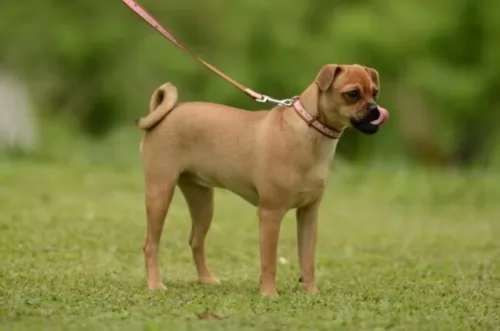 The Muggin is not a purebred dog but rather a cross breed. The hybrid dog population has exploding in the United States in the past ten to fifteen years. A lot of the success of crossbreeding can be attributed to the marketing of these dogs as “Designer Breeds”.
The Muggin is not a purebred dog but rather a cross breed. The hybrid dog population has exploding in the United States in the past ten to fifteen years. A lot of the success of crossbreeding can be attributed to the marketing of these dogs as “Designer Breeds”.
Designer breeds are developed because someone wants some of the characteristics of Breed X and some of the characteristics of Breed Y. Therefore, Designer breed XY is developed. In order to understand this hybrid dog, you need to understand the two purebred breeds they come from. The Muggin is the result of crossing the purebred Pug and the purebred Miniature Pinscher or Min Pin. So, we need to look at the origins of these two purebred breeds.
They are also referred to as Pin Pugs, Min Pin Pug, Pug Pin, Pugscher and were originally the Carlin Pinscher. However, these days there are other breeds besides the Pug and Min Pin making up the gene pool for the Carlin Pinscher. Because of this the Muggin has been separated from the Carlin Pinscher. The American Canine Hybrid Club has accepted the Muggin name for the Pug Min Pin cross.
Pugs are originally a Chinese breed and they were companions rather than working dogs of any kind. During the Han Dynasty they were the dogs of royalty. At the same time there were dogs very much like the pug in Japan and Tibet. The Pugs came to Europe by way of trades with the Dutch who then brought them to Europe. They were named the Mopshond and they caught the eye of the royalty in Europe as well.
Pugs were imported to the United States after the U.S. Civil War and in 1885 they were recognized by the American Kennel Club and called Pugs.
The Min Pin traces its origins to Germany a few hundred years ago. They were “ratters”, guarding the house and stables from all types of vermin. Most dog people believe that the Min Pin is much older than this, perhaps by thousands of years. Yet there is no detailed history to support that. Most believe the breed comes from the German Pinscher line. There might also be some Daschund and Greyhound in that line.
They were once called the Reh Pinscher. This was their name when they came to North America in 1919 and then the breed was renamed in 1972. The Miniature Pinscher Club of America was started in the early 1900’s while the AKC recognized the Min Pin in 1929. Today the Miniature Pinscher is a family dog, a companion.
The Muggin is a loving and loyal dog. All they want is for you to be happy and to share that happiness with them. They can also easily become a one person dog and bond intensely with that one person. They are not a hybrid that you can leave home alone while you go to work for 8 to 10 hours a day. No, the Muggin needs attention and lots of it. Despite this they are great with both kids and other dogs.
Because they are a cross breed, they are not recognized by the American Kennel Club. However, some hybrid registries do recognize the Muggin. These include the Designer Breed Registry, the International Designer Canine Registry, The Designer Dogs Kennel Club, the American Canine Hybrid Club, and the Dog Registry of America.
 Athletic, muscular and sleek, the medium to large sized German Shorthaired Pointer is at home on land and water. He stands between 53 to 63cm in height and weighs roughly between 20 – 32kg.
Athletic, muscular and sleek, the medium to large sized German Shorthaired Pointer is at home on land and water. He stands between 53 to 63cm in height and weighs roughly between 20 – 32kg.
The eyes are brown, the ears are fairly long, they are floppy and set high on the head. The tail is always docked to a particular length and is held straight out from the body so that it actually forms a line with the entire body and the head.
The dog has a short coat which is essentially a combination of liver and white speckles or dappling.
A whole lot of factors come into play when looking at the temperament of a dog. The kind of owners the dog has can have a huge affect on the way he turns out. Nonetheless every dog, including the German Shorthaired Pointer will require training and socialization to become obedient and relaxed around strangers and other pets.
The German Shorthaired Pointer is an intelligent, confident, bold, affectionate dog that wants to please his owners and he is easy to train. He is good with children too, just loving all interaction with his human family.
He is an energetic dog and will require plenty of exercising to avoid him becoming bored, frustrated and destructive.
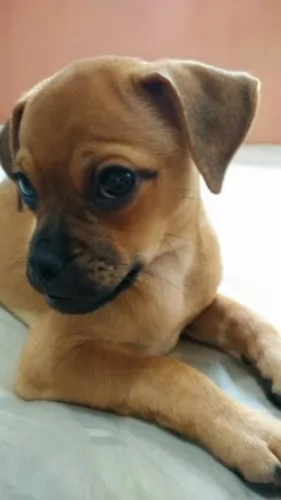 As previously mentioned, the Muggin is a cross between the Pug and the Miniature Pinscher. They are small, shave sturdy legs, floppy ears, and a wrinkled forehead for the most part. Like all hybrids however, all first generation dogs do not look the same. Some might resemble the Min Pin more and others the Pug. Some might have the stockier body of the Pug and the short tail of the Min Pin. Or one could have the Pug’s curly tail and the athletic body of the Min Pin. The snout can be short or long, the ears heavy and floppy or small and thin.
As previously mentioned, the Muggin is a cross between the Pug and the Miniature Pinscher. They are small, shave sturdy legs, floppy ears, and a wrinkled forehead for the most part. Like all hybrids however, all first generation dogs do not look the same. Some might resemble the Min Pin more and others the Pug. Some might have the stockier body of the Pug and the short tail of the Min Pin. Or one could have the Pug’s curly tail and the athletic body of the Min Pin. The snout can be short or long, the ears heavy and floppy or small and thin.
Their coats will usually be fine and short, and colors can vary a lot. They might be black and tan like a Min Pin, or more like a Pug with a solid color of cream, brown, black, white or golden. They also tend to shed quite a bit no matter which parent they take after the most. They will either have brown noses and black eyes or brown eyes and black noses or any combination of black and brown.
If Muggins are only bred to Muggins the second and third generations will resemble each other more than the first generations will. However, at this point many breeders will try to strengthen the breed by occasionally adding in to the gene pool other dog breeds.
 As an intelligent hunting dog, the German Shorthaired Pointer is also a loving family companion and he just loves spending time outdoors with his human family.
As an intelligent hunting dog, the German Shorthaired Pointer is also a loving family companion and he just loves spending time outdoors with his human family.
He is pretty much an all-rounder – playful, energetic, a good watchdog and a loving and devoted family friend.
For an active, outdoor kind of family, include the German Shorthaired Pointer in all your activities and you’re going to ensure that you have a most wonderful 4-legged friend.
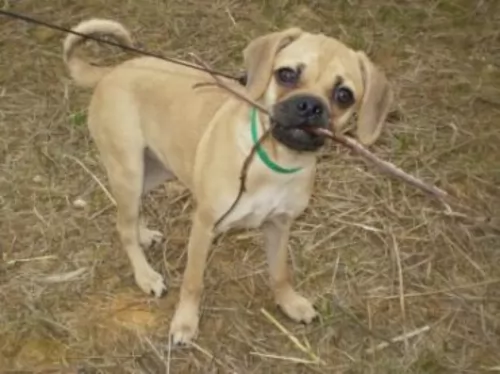 They are good with children but should be supervised.
They are good with children but should be supervised.
Energetic and loving little dogs.
Very adaptable if taken for walks or has space in a yard. Can live anywhere under those circumstances.
Very intelligent but strong willed dog. Needs strong leadership from their person.
 Most German Shorthaired Pointers are healthy dogs, but even so, just like with any other dog breed, they can be subject to some hereditary disorders as well as some of the other common dog illnesses there are -
Most German Shorthaired Pointers are healthy dogs, but even so, just like with any other dog breed, they can be subject to some hereditary disorders as well as some of the other common dog illnesses there are -
Dogs are such devoted family members that you just want to give in to them and pop the chocolate treats you love into their mouths. But dog’s can’t eat chocolate! Just one piece can affect a small dog. Symptoms of chocolate poisoning include diarrhea,vomiting, panting and shaking and even worse, a heart attack. If your dog has got hold of some chocolate, get him to the vet immediately.
Your German Shorthaired Pointer, as a puppy, should have his puppy vaccines. If your dog has this terrible disease, he will be lethargic, have diarrhea and almost seem out of it. Survival isn’t always guaranteed and the best way to avoid this killer disease, is to ensure your puppies vaccinations are up to date.
Check your pet for Bloat or an enlarged stomach which can twist because of trapped gas. This can be deadly for your pet. Get him immediately to the vet. He’ll be restless, lethargic and trying to vomit.
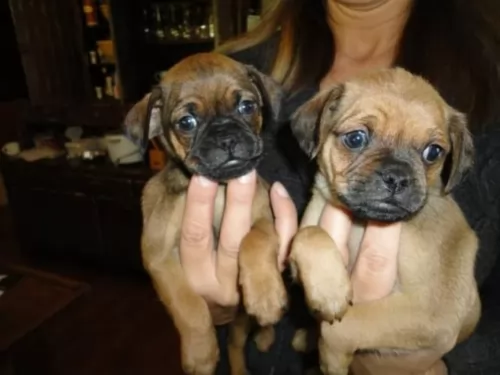 The first generation of Muggins may face all the health issues of either or both their parents, while second and third generations tend to have less health issues, They types of issues the first generation of Muggins might face include:
The first generation of Muggins may face all the health issues of either or both their parents, while second and third generations tend to have less health issues, They types of issues the first generation of Muggins might face include:
Nerve Degeneration – Degenerative Myelopathy or Dm – causes paralysis and eventually fatal.
 The German Shorthaired Pointer isn’t a heavy shedder. He has a short coat which requires brushing at least twice a week to remove loose hairs and keep it shiny and sleek.
The German Shorthaired Pointer isn’t a heavy shedder. He has a short coat which requires brushing at least twice a week to remove loose hairs and keep it shiny and sleek.
Also check in- and outside the ears, clip his nails and brush his teeth 2 or 3 times a week.
Only the highest grade kibble will do. Mix in some of your own home-made cooked brown rice, vegetables and chicken from time to time and also ensure your pet gets in some raw meat as well. Cool, fresh water should be constantly available.
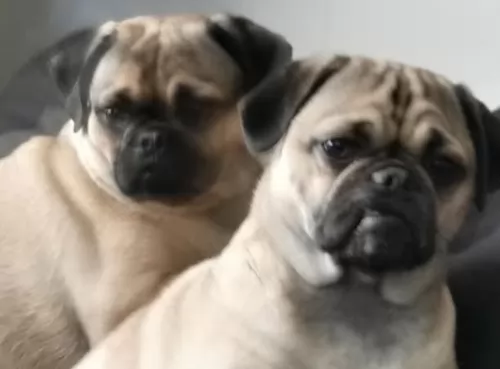 This crossbreed has a definite propensity to overeat and become obese from puppyhood. Feed the puppy a small dog dry food 3-4 times a day a total of ¾ of a cup to 1 cup.
This crossbreed has a definite propensity to overeat and become obese from puppyhood. Feed the puppy a small dog dry food 3-4 times a day a total of ¾ of a cup to 1 cup.
Again don’t over feed the adult Muggin or he will become obese easily. Feed at least twice a day one to one and half cups total.
High Energy
With the athleticism of the Min Pin taking precedence over the less active Pug, the Muggin is a fairly active dog. The Muggin is also not effective by the Pug’s difficulty with heat and cold. They love to go on long walks and need exercise to keep from being bored and destructive. However, remember there is a Pug in your Muggin and if she is not into exercise don’t try to get her to do more than she can.
You do want your Muggin to get enough exercise to fend off any tendency to be overweight. They are good at agility, jogging, obedience and watchdog activities.